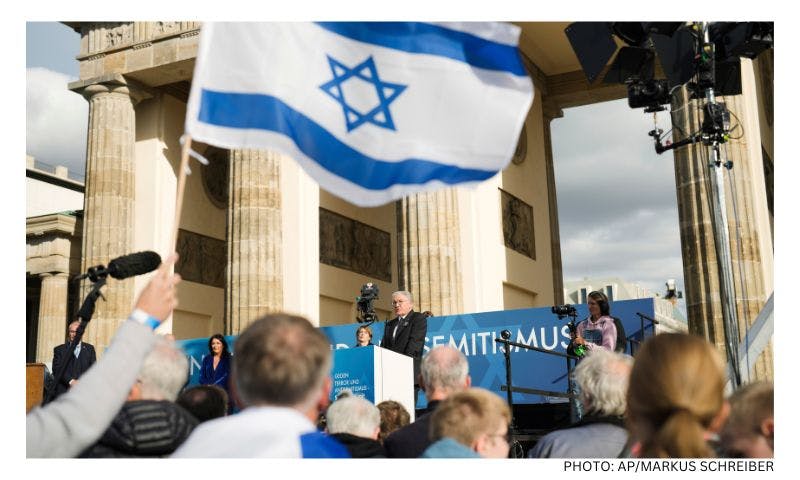Published: 11 February 2021
Last updated: 4 March 2024
WITH ISRAEL MORE ACCEPTED and secure in the region amid normalisation with the United Arab Emirates, Bahrain, Sudan and Morocco, it is time to build on the momentum and take a major step forward with the Palestinians, the party at the core of the conflict.
Even if negotiations for a full peace are not imminent in part because brokering Israeli-Palestinian talks does not seem an immediate priority of the new Biden administration, there are steps Israel can take now to pave the way for having a viable negotiating partner in the future.
One of them is to freeze settlement expansion and land expropriation so that the Palestinians are left with territory when their state emerges from the negotiations.
The other is to release Fatah leader Marwan Barghouthi, serving five life sentences for murder during the second intifada in which he had a leadership role. While painful to victims' families and politically difficult, the release of the most popular Palestinian leader could inject new life into decaying Palestinian politics and institutions and furnish a leader with the backing to negotiate.
Mahmoud Abbas, the 85-year-old president whose resignation is desired by two thirds of the Palestinian public according to surveys, is too unpopular to lead peacemaking while both Benjamin Netanyahu and Gideon Sa’ar, his main challenger, prefer de facto annexation of the West Bank.
But continuing the status quo is against Israel's interest and morals since it perpetuates the occupation and will make it impossible for Israel to be a democratic state with a clear Jewish majority. And the status quo also acts against the Palestinian right to self-determination, an independent state and a decent future.
Not only dovish MKs who have met with him over the years but also Giora Eiland, the former head of Israel's National Security Council, have assessed that Barghouti would not return to violence.
This seemingly hopeless situation can and must begin to be changed as part and parcel of the new winds sweeping the region. Normalisations with Arab states will be hollow without addressing the real peace that needs to be made to end over a century of conflict with the Palestinians.
Releasing Barghouti could create dynamism and energy in place of stagnation and pave the way for a new beginning on the Palestinian side. Above all, it would give the Palestinians hope. This is a worthwhile goal for the Biden administration to press for.
Not only members of the Israeli peace camp but also Giora Eiland, the former head of Israel's National Security Council, have assessed that Barghouti would not return to violence.
Former Meretz MK Isawi Freij told The Jewish Independent that Barghouthi’s thinking has evolved and he is ‘’directed towards negotiations’’.
It is worth recalling that Barghouti, as secretary general of Fatah in the West Bank, was a key figure in gathering support for the Oslo peace process and as a member of the Palestinian Legislative Council, cultivated ties with Israeli MKs and peace activists.
He turned to violence as a leader in the second intifada, reportedly founding the al-Aksa martys brigades which carried out devastating suicide bombings. He denied being its leader and called in statements for attacks to be limited to soldiers and settlers in the West Bank and Gaza, not Israel proper.
He is serving five life sentences for murder for the deaths of four Israelis and a Greek monk after being arrested in 2002. Two of the attacks took place inside the ‘Green Line’. He was acquitted of 21 counts of murder. Precisely because of his jail time and the perception that he is a freedom fighter who acted to combat occupation and that he is clean of corruption, he has popularity and credibility well beyond any other Palestinian leader.
According to a December poll by the Palestinian Centre for Policy and Survey Research, he would trounce Hamas leader Ismail Haniye in presidential elections by 61 to 37 percent. Abbas would lose to Haniye. Presidential elections are scheduled for July.
Yesterday, on February 14, after receiving permission from Israel, Abbas ally Hussein Sheikh, the PA Minister for Civilian Affairs, visited Barghouthi in prison in what was seen as a bid to dissuade him from running against Abbas.
Israel has released individuals with far more blood on their hands than Barghouthi, including Nasir Yatame, serving 29 life sentences for planning a Passover bombing in Netanya that killed 30 civilians and wounded 140.
Barghouti falls into the category of someone with "blood on their hands" and that is the most common argument against his release. But in the 2011 Gilad Shalit deal with Hamas, when one Israeli soldier was exchanged for 1037 Arab prisoners, Israel released individuals with far more blood on their hands than Barghouthi, including Nasir Yatame, serving 29 life sentences for planning a 2002 Passover bombing at a hotel in Netanya that killed 30 civilians and wounded 140.
"According to Israeli principles we shouldn't release people with blood on their hands but we did it," Eiland told The Jewish Independent.
Eiland does not think Barghouthi would organise terrorist attacks if released. "I'm not suggesting he is such a bad person that the first thing he would do is organise a wave of terror like 20 years ago. I don't think this is his motive today. If expected to be a real political leader, he personally might completely give up terroristic spirit and be a more calculated leader.
“He's not motivated by religious incentives; he might be much more practical. I'm not saying if released he's a person we'd never be able to try [dealing with].”
Still, Eiland termed the crimes Barghouthi was convicted of as "unforgivable", making him conclude, after much deliberation that he opposes a release. But this conclusion is mistaken, for to bring a better future for both peoples it is necessary in this case to look beyond the past.
The late former defence minister Binyamin Ben-Eliezer, of the Labor party, was a strong advocate of releasing Barghouthi, reasoning that he could deliver a peace deal that Abbas could not.
If released, Barghouthi would engage in institution strengthening and non-violent resistance, predicts Menachem Klein, a specialist on Palestinian politics at Bar Ilan University near Tel Aviv and the author of Arafat and Abbas: Portraits of Leadership in a State Postponed.
"He'll first make order at home," Klein told The Jewish Independent. As for the type of resistance, he says: "We are talking about sitting on roads to settlements and controlling the protesters not to slide into violence." Klein says Barghouthi would invest in efforts to build up the Palestinian Authority education system.
Klein believes Barghouthi would be a force for stability rather than chaos when Abbas passes from the scene. "What is better to have? Chaos or a person that can create order and have people behind him?"
Issa Amro,a Palestinian activist in Hebron who espouses non-violence and civil disobedience, said Barghouthi has sent words of encouragement from prison to him. He predicted Barghouthi would oversee "blocking roads to settlements and helping farmers farm their land". He said he did not know what Barghouthi's stance on stone-throwing would be.
To settlers, the road sit-ins would threaten the status quo but for Palestinians they would be an expression of non-violent resistance which focuses the struggle and the statehood aspirations in the West Bank..
If Israel wants a viable Palestinian leader with the potential to turn into a peace partner, it should release Barghouthi. But right now it does not. As Eiland told me: "Israel now is not keen to resume negotiations with the Palestinians, so it sees no reason to pay a price just in order to be able to negotiate with someone."
READ MORE
Fatah and Hamas agree on terms of 1st Palestinian election in 15 years (Times of Israel)
Deal reached at Cairo summit between 14 factions; Palestinians are skeptical that the vote will be held at all, as election promises have fallen through before
Arab FMs renew support to two-state solution, ending debate over ‘deal of century’ (AAWSAT)
Photo: Marwan Barghouti going to prison (Baz Ratner/Reuters)




